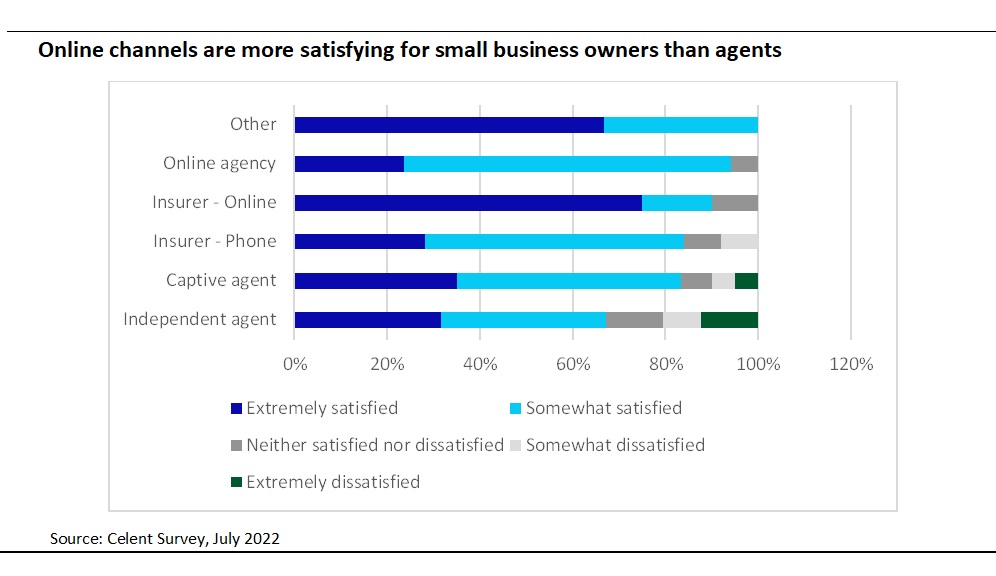Two-thirds of small businesses use insurance agents to buy insurance for their enterprises, but those buying insurance online report higher satisfaction with the buying process, according to a new survey report.
Earlier this week, Celent, a global research and advisory firm focused on technology for financial institutions, published the report titled “The Tipping Point? The Race to Online Buying for Small Commercial Insurance.”
According to the latest report, 36 percent of small business owners bought their current policy—usually a businessowners package policy—with the help of an independent agent, and another 30 percent used a captive agent that represents a single insurance company.
While only 14 percent reported buying online directly from an insurance carriers, 75 percent of those online direct buyers reported being “extremely satisfied” with the process. In contrast, only 32 percent of those using independent agents were “extremely satisfied,” and just 35 percent of those using captive agents reported extreme satisfaction, Celent reported based on results of an online survey of 201 small businesses conducted in July 2022.
According to the report, in addition to the two-thirds of respondents buying through independent and captive agents, and the 14 percent buying directly online, carrier phone sales accounted for another 12 percent of responses. Another 4 percent reported buying current policies through online agencies, and the remaining 3 percent marked “other” as the channel used to secure existing coverage.
In terms of satisfaction ratings, policyholders using “other” means of buying coverage—”primarily affinity marketing”—are also a very happy group. Just about two-thirds said they were “extremely satisfied” with the process (67 percent), and the remainder said they were “somewhat satisfied.” None of these buyers were dissatisfied, while 12 percent of those buying through independent agents said they were “extremely dissatisfied.”
“The implication for insurers is that those looking to attract small businesses would do well to work with affinity groups,” the report suggests.
Attempting to explain the high satisfaction with online insurers, the report highlights carriers’ “ability to control the customer experience—and bind online—making it a complete experience,” also suggesting that insurers that are committed to the independent agent channel should “continue to invest in making the agent experience as fast and easy as an online experience in order to help their agents keep those policyholders that are leaning towards an online experience.”
And they may be leaning more in that direction in the future, other survey results suggest.
When specifically asked how likely they are to purchase their insurance online in the future, the majority of small business owners surveyed (73 percent) said they were extremely or somewhat likely to do so. This is almost double the number from just two years ago, when Celent asked that same question for a similar report and just 38 percent expressed a likelihood of purchasing online in the future.
“It’s possible this shift is simply due to more availability of commercial insurance online. It’s also possible that COVID fundamentally changed buying processes,” the report says.
In fact, while the numbers of small businesses already buying online are small, they have grown since the 2020 survey, Celent reported. In the 2020 study of small commercial buyers, none of the respondents said they purchased their current insurance online. This year the figure is 18 percent, the report notes, with 14 percent buying directly from an insurer online and 4 percent using online agencies.
Going forward, those who prefer to purchase through an agent will switch if they can get a lower price online, Celent found. When asked specifically to choose between buying online and using an agent—and also told that the agency option would cost more—65 percent of respondents who initially said they had a very high preference toward having an agent involved said they’d opt for an online channel for lower cost coverage.
The report also presents information on what factors, other than price, weigh into small business owners’ insurance buying decisions, desired process improvements and self-service options, and attitudes toward technology by age group. After summarizing the survey results, Celent also delivers specific recommendations about carriers that want to support existing agents, those who want to use digital agents and those that want to address the growing online market by selling direct.






















 New Texas Law Requires Insurers Provide Reason for Declining or Canceling Policies
New Texas Law Requires Insurers Provide Reason for Declining or Canceling Policies  The Future of HR Is AI
The Future of HR Is AI  Telematics and Trust: How Usage-Based Insurance Is Transforming Auto Coverage
Telematics and Trust: How Usage-Based Insurance Is Transforming Auto Coverage  Reinsurance Program Could Wipe Out Need for Calif. FAIR Plan: Legal Exec
Reinsurance Program Could Wipe Out Need for Calif. FAIR Plan: Legal Exec 




